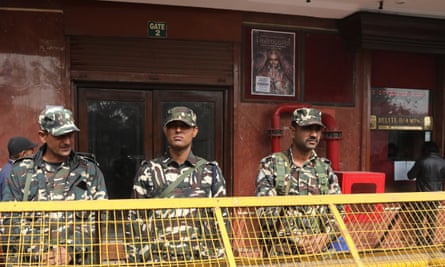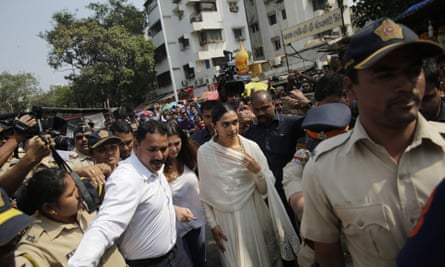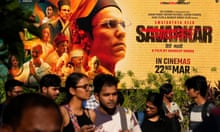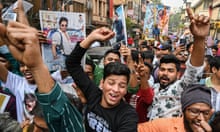The Bollywood epic Padmaavat has opened in cinemas across India under blanket security after months of fierce protests.
The film crew has been attacked, sets have been vandalised, hardliners have threatened to mutilate the lead actor and Indian states have pleaded with the supreme court and prime minister to ban the film.
Violent mobs rampaged through several Indian cities this week in a last-ditch effort to stop the film, which is based on a five-century-old poem about a Hindu queen, Padmini, who immolates herself rather than be captured by a conquering Muslim ruler.
In Mumbai, mobs have set fire to cars. In Gurgaon, a satellite city south of Delhi, people set fire to a bus and pelted stones. A school bus in Haryana state was attacked on Wednesday, while riot police clashed with hundreds of protesters in Uttar Pradesh and Gujarat states.
There was a heavy security presence outside north Indian cinemas screening the film on Thursday. Indian media reported that several venues had been attacked in Bihar and that a man had attempt to self-immolate outside a cinema in Varanasi.

Police have arrested 18 men in connection with the attack on the Haryana school bus, video footage from which showed children crying in the aisles as sticks and stones were hurled at the vehicle.
The controversy erupted a year ago when rumours spread that the film, starring Deepika Padukone and directed by Sanjay Leela Bhansali, would depict a love scene between the queen and a Muslim conqueror, Alauddin Khilji.
No such scene exists, but the repeated denials by Bhansali have failed to douse the protests and violence, which swelled again after the release of the film’s first trailer, depicting Padmini dancing and baring her midriff.
The purported romance and the trailer have been interpreted as deeply dishonourable to Padmini, who is especially revered by Rajputs, one of India’s largest caste groups and one fiercely proud of its claimed origins from north Indian warrior stock.
“She sacrificed her life because of atrocities against women,” said Giraraj Singh Lotwada, the president of the Jaipur-based Rajput Sabha. “She is very respected. We pray to her, take her as our goddess.”
He said he did not endorse violence in the name of stopping the film, but added: “This is retaliation, it is counter-violence, in response to the actions of the police.”
Q&AHow influential are India's extremist Hindu organisations?
Show
Extremist Hindu organisations wield unprecedented influence across India. They have always existed, and were tolerated by previous governments. But the current prime minister, Narendra Modi, is a lifelong member of India’s largest Hindu nationalist organisation, and critics say his ascension has been a green light to radical groups.
The past four years have seen a surge in attacks on Muslim or low-caste Hindu cattle traders and growing campaigns against “love jihad”, the baseless fear that Muslim men are conspiring to marry Hindu women.
Dhirendra K Jha, an Indian author, says the “perfect parallel” is the growing boldness of white nationalist groups in the US under Donald Trump.
“Modi would never come out and openly help [extremist Hindu groups],” Jha says. “But he rarely criticises them. Because of his silence, the message goes to the state machinery that they don’t have to take action against them.”
Though historians generally argue there is no evidence Padmini existed, her myth has gained enormous symbolic power among Rajputs in a country where religion and caste still shape how most people work, where they live and whom they marry.
Dozens of Rajput women have threatened to burn themselves alive if Thursday’s debut goes ahead. “We are not afraid of death,” their leader told Indian media this week.
Fanatics have threatened to torch UK cinemas that screen the film and offered bounties of up to 50m rupees (£550,000) to anyone who beheads Padukone.
Anna MM Vetticad, an Indian film critic and author, said the outrage was partly opportunistic on the part of the Karni Sena, the hardline Rajput group leading the protests.
“Karni Sena was unknown outside Rajasthan so far,” she said. “In 2010 when they vandalised theatres in Rajasthan over a less high-profile film, they barely received attention. By now strategically going after a highly anticipated film like Padmaavat, they have gained national visibility.”

The ruling Bharatiya Janata party was also capitalising on the anger, she said, with some party members issuing threats against the filmmakers. “[They are] obviously pandering to conservatives in the Rajput community, which is a dominant force in Rajasthan, where elections are due this year, and Hindu conservatives at large who are their primary constituency,” she said.
“Nobody here is screening this movie,” said Neeraj Ahuja, the general manager of Wide Angle Multiplex, a large cinema in Ahmedabad in Gujarat. “There is too much disturbance. No amount of security can help. People will buy tickets and then do damage to our property.”
Gujarat was one of several states to ban the film, a decision that was overturned by the Indian supreme court last week, which argued free expression should not be compromised by threats of violence.
The Multiplex Association of India, which represents around 75% of large cinemas, said members in Rajasthan, Madhya Pradesh and Goa were also afraid to show the film.
But some analysts believe the controversy might translate into box office success. “The movie will make 1bn rupees over the long weekend from Thursday to Sunday despite the protests,” the trade analyst Akshaye Rathi told Agence France-Presse.









